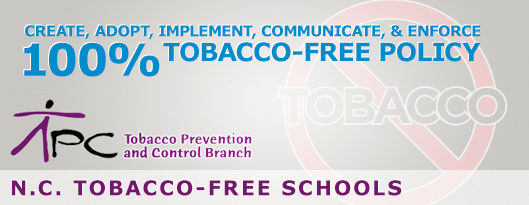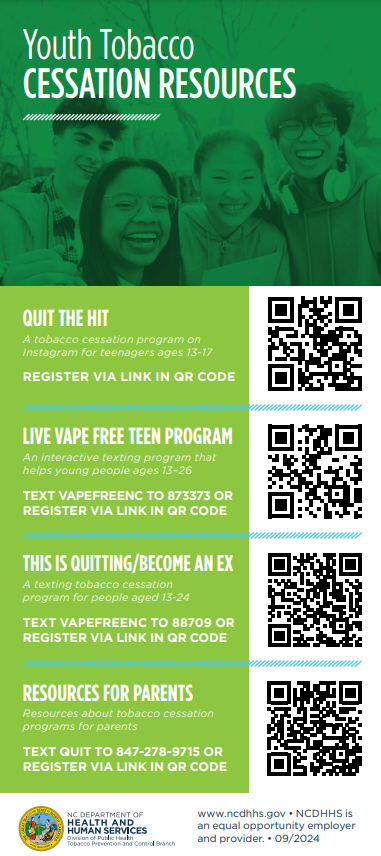


Please educate and train school staff to support this policy and tobacco-free school compliance by using the following tools and resources.
In 2018 North Carolina celebrated two decades of our statewide 100 percent tobacco-free school law, which was the major driver in lowering cigarette smoking rates among NC middle and high school students to historic lows. However, progress is eroding due to what the US Surgeon General has called “the e-cigarette epidemic among youth."
We know what works to effectively protect young people from all forms of tobacco, including e-cigarettes, cigarettes, cigars and little cigars, and hookah. Below are resources to help schools and parents deal with this new and growing challenge. Here is a list of Youth-Centered Tobacco Prevention and Cessation Resources.
Implement Effective 100% Tobacco-Free School Policies
N.C.G.S. §115C-407 requires that every North Carolina school district have a written 100 percent tobacco-free school policy that prohibits the use of any tobacco products, including e-cigarettes, on campus and at school-related events for students, staff and visitors. Schools and communities should continue to educate and train school staff to support this policy and tobacco-free school compliance.
For students who violate the tobacco-free schools’ policy, we recommend:
Call in a Consultant
Your Regional Tobacco Control Manager is available to provide technical assistance on tobacco-free policy issues and to implement a tobacco prevention and control program, including e-cigarette/vape/Juul educational program.
The following free resources are available to your school and community partners to address the surging use of e-cigarettes/vaping devices among youth.
Implement Curricula
CATCH My Breath™is an evidence-based tobacco use prevention curriculum that addresses middle and high schoolers’ use of e-cigarettes and meets national and state educational standards. The curriculum is available free of charge to NC schools. Find other free and effective options in this resource list
We do not recommend tobacco prevention and cessation programs being promoted by or funded by tobacco or e-cigarette companies. Many past studies have shown such programs are ineffective, at best.
Help teens quit tobacco
The NC Tobacco Prevention and Control Branch partners with three quit vaping programs that give young people options to get their support they need to quit successfully.

Youth-Centered Programs and Resources (PDF, 865 KB)
The following posters, envelope stuffers, and newspaper ads that promote 100 percent tobacco free schools are available at no charge as a part of the Health and Wellness Trust Fund media campaign.
- 100% Tobacco Free Schools Adult Compliance Posters
- We’re Watching (Red) (PDF, 12.2 MB)
- We’re Watching (Desk) (PDF, 13.8 MB)
- We’re Watching (Locker) (PDF, 12.5 MB)
- 100% Tobacco Free Schools Posters
- 100% TFS Poster 1 (pdf 539 kb)
- 100% TFS Poster 2 (pdf 476 kb)
- 100% TFS Poster 3 (pdf 481 kb)
- 100% TFS Poster 4 (pdf 1,367 kb)
- 100% TFS Poster 5 (pdf 783 kb)
- 100% Tobacco Free Schools Newspaper Ads
- 100% TFS Newspaper Ad 1 (pdf 720 kb)
- 100% TFS Newspaper Ad 2 (pdf 627 kb)
- 100% TFS Newspaper Ad 3 (pdf 902 kb)
- 100% TFS Newspaper Ad 4 (pdf 622 kb)
- 100% TFS Newspaper Ad 5 (pdf 632 kb)